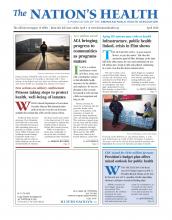Even prior to childbirth, symptoms of anxiety and depression in parents may explain why their children become fussy eaters, a recent study finds.
The research was published online Feb. 25 in Archives of Disease in Childhood.
While fussy eating happens often during childhood, the reasons why it happens are unclear, said Lisanne de Barse, MSc, a doctoral student at Erasmus University Medical Center in Rotterdam, Netherlands, and researcher at ErasmusAGE of the Rotterdam International Aging Research Center.
“Studies have shown that mothers’ internalizing problems — anxiety and depression — during the child’s life was linked to child fussy eating,” de Barse told The Nation’s Health. “It was not clear, however, whether the child’s eating problems causes stress and psychiatric symptoms in mothers or whether mothers’ symptoms predict child eating behavior, nor was it known what potential impact the dads’ state of mind have.”
The study looked at over 4,700 children and their mothers in the Netherlands. Researchers looked at symptoms of anxiety and depression in women during pregnancy and then three years later when the child was preschool age. The study used a food fussiness scale to assess fussy eating based on their willingness to try new foods and whether they had a limited diet. Researchers also looked at whether children refused to eat or did not eat well in the last two months, the study said.
Kids whose mothers had anxiety and depression during pregnancy and while the children were in preschool had higher scores on the food fussiness scale, compared to kids whose mothers had no symptoms, the study said. In a sample of over 4,100 children and their fathers, researchers found a link between fussy eating and fathers’ anxiety while the child was in preschool. There was also a link to fussy eating in kids whose fathers had symptoms of depression before birth and during preschool.
Researchers wrote that it is possible that fathers with anxiety may pressure their kids to eat certain foods, which can lead to fussy eating as well.
De Barse said even mild forms of depression and anxiety symptoms in parents may influence child fussy eating and that health professionals should be aware of the signs in parents.
“They could screen the soon-to-be parents for anxiety and depressive symptoms and, if needed in their professional opinion, they could advise the parents to consult a psychologist or psychiatrist, because anxiety and depression could have an impact on both the parents themselves and on their child,” de Barse said.
For more information, visit http://adc.bmj.com/content/early/2016/02/08/archdischild-2015-309101.full?sid=0fc10441-1ac6-4ea7-9c79-8a9949a9df8b.
- Copyright The Nation’s Health, American Public Health Association









